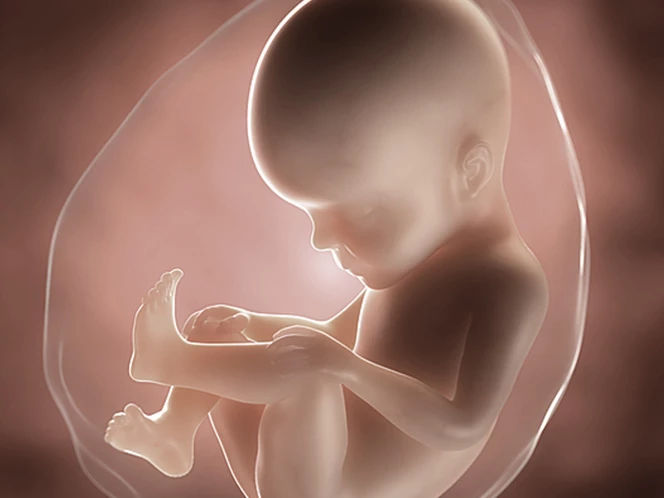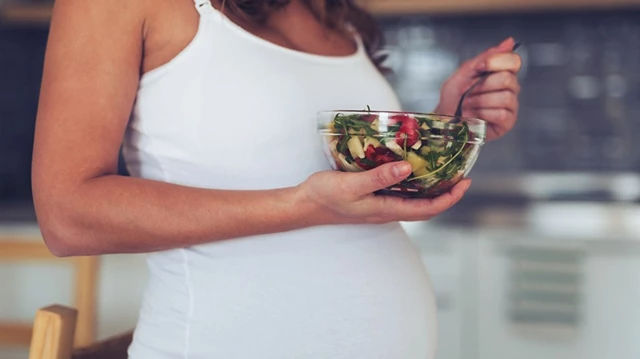At 27 weeks pregnant, you’re coming to the end of your second trimester. At this point in your pregnancy, you might still be experiencing a number of pregnancy symptoms, particularly as pregnancy hormones like progesterone continue to flow around your body. You might also be feeling the impact of your growing baby on your lower back and stomach as they get bigger and approach their due date.
27 weeks pregnant: pregnancy symptoms and your baby’s development

Explore pregnancy stages week by week
Let’s take a closer look at what you can expect at 27 weeks pregnant, how your baby is developing, and what you can do to look after your mind and body towards the end of your second trimester.
Get more pregnancy and parenting advice from our baby experts.
How many months is 27 weeks pregnant?
27 weeks in months is just over 6. At 27 weeks pregnant, you’re just over 6 months into your pregnancy – two-thirds of the way through1.
You’re into the last week of your second trimester - time to prepare that baby name shortlist!
 Your baby's development at 27 weeks
Your baby's development at 27 weeks
Your baby’s development at 27 weeks pregnant
At 27 weeks’ gestation, your baby’s lungs are almost fully developed and capable of breathing1. Their senses are maturing, and they can now open and close their eyes and turn their head towards bright lights. They’re also able to smell, taste and hear more as their brain develops, ready to experience the outside world2.
How big is my baby at 27 weeks pregnant, and what do they look like?
At 27 weeks, your baby (or foetus) is now around 37cm long from the top of their head to their heel (about the size of a head of cauliflower)1.
A few weeks ago, your baby was covered in wrinkly skin folds and looked a little like a prune. Now, they’re developing layers of fat, becoming plumper, and looking more and more like a newborn1.
Pregnancy at 27 weeks (second trimester): what changes are happening in your body?
At 27 weeks pregnant, you’re likely noticing some weight gain as your baby grows and your body stores fat ready for breastfeeding3.
The additional weight pressing on your stomach, plus your changing pregnancy hormones (including progesterone), can lead to unpleasant pregnancy symptoms like bloating and constipation. Drinking plenty of water and eating lots of high-fibre foods can help1.
7 weeks pregnant: signs and symptoms
You’re certainly not alone - sleeping issues are common at 27 weeks pregnant.
At the end of your second trimester and into your third, your growing bump might make it harder to get a good night’s sleep. Lying down might be uncomfortable, and the pressure on your bladder might mean you’re going to the loo more often4.
Sleeping on your back while pregnant can be dangerous as you enter your third trimester. Instead, try sleeping on your left or right side to keep you and your baby safe1.
To keep comfy, you could try1:
- Using a pillow to support your bump
- Putting another pillow between your legs
- Bending your knees
Don't worry if you wake up on your back, though; simply turn onto your side before you drift back to sleep4.
Read our advice for getting a better night’s sleep during your pregnancy.
As your body grows during your second trimester and beyond, your skin stretches around your bump, upper thighs, and breasts. This can leave narrow lines on the surface of your skin, called stretch marks. Most of the time, these marks fade after your baby is born5.
Moisturising your body daily can help to keep your skin supple and ease any itchiness. This has the added bonus of helping you to stay in tune with the changes that are happening to your body during pregnancy, particularly your breasts, so you know when to seek advice.
Heartburn (indigestion or acid reflux) is common in pregnancy, particularly from the second trimester onwards6.
You might notice6:
- a pain or burning sensation in your chest
- bloating
- excessive burping
- feeling or being sick
Try eating smaller meals more often and sleeping in an upright position to help ease symptoms and discomfort6. If your symptoms get worse, speak to your GP who can talk to you about your options for medication.
It’s normal to feel dizzy or faint sometimes during pregnancy due to a combination of hormone changes, overheating, or low blood sugar7. It can also be the result of low blood pressure too.
You can help prevent dizzy spells by getting up slowly from your bed or the bath, eating small meals often to keep your blood sugar levels stable, and drinking plenty of fluids7.
Urine infections, or UTIs, are another very common symptom in pregnancy, and the symptoms include pain or burning when you pee, needing to go to the loo more often, or having a high temperature8.
It’s important to treat urine infections to prevent them from spreading to your kidneys or making you very poorly. So if you have symptoms of a UTI, make sure you speak to your GP9. It’s also a good idea to take a urine sample to every midwife appointment, so that it can be checked for any infection.
Restless legs syndrome (RLS) is common in pregnancy, affecting 1 in 5 expectant mums. It can cause an overwhelming urge to move your legs, especially at night, and a crawling feeling in your thighs, calves or feet10.
It can sometimes be linked to anaemia, and your midwife will check for this as part of your 28 weel blood tests as you head into your third trimester11.
RLS usually disappears once your baby arrives. In the meantime, try to exercise gently during the day to help ease the symptoms10.
There’s more blood moving through your body during pregnancy, which, combined with hormonal changes, can make nosebleeds more common12.
If you do get a nosebleed, following these steps can help12:
- Sit down
- Firmly pinch your nose just above your nostrils for 10-15 minutes
- Lean forward and breathe through your mouth
- Avoid blowing your nose or bending forward for at least 24 hours
If your nosebleed doesn’t stop, seek medical advice.
Vaginal infections like thrush can happen during pregnancy and cause symptoms like13:
- Itching or soreness around your vagina
- Green or yellow discharge with an unpleasant smell
- Pain when you pee
Infections like thrush can usually be treated easily. But always speak to your GP or midwife before using any treatments, as not all of them are safe to use when pregnant13.
27 weeks pregnant: next steps
Here are some useful tips and things to try when you’re 27 weeks pregnant to stay healthy and prepare for your new arrival.
Whooping cough vaccination
Having the whooping cough vaccine while pregnant can protect your baby from developing the condition when they’re born1. By now you should have been offered this, as the vaccine is recommended from 16 weeks1.
From 28 weeks, you’ll be offered the RSV vaccine to protect you and your baby against the respiratory syncytial virus – a common cause of coughs and colds14.
Pelvic floor exercises
Strengthening your pelvic floor muscles is a great way to prepare your body for labour as you approach your due date15.
Try out pelvic floor exercises by15:
- Finding a comfortable position, either sitting or lying down.
- Squeezing your pelvic floor inwards as if you were trying to stop yourself from peeing.
- Breathing in as you squeeze and then breathing out as you relax.
Try to do three sets of eight squeezes per day. As your pelvic floor muscles get stronger, you should be able to hold your squeezes for longer.
Emotional wellbeing
It’s just as important to look after your mental health during pregnancy as it is to take care of your physical health. To look after your emotional wellbeing, you could16:
- Talk to your partner, friends, family, or midwife about anything that’s worrying you.
- Stay active – even a gentle walk each day can help.
- Eat a healthy, balanced diet.
- Join an antenatal class to meet other expectant parents going through the same journey and emotions.
If you’re struggling with your emotions or mental health, speak to your GP or midwife. They can give you personalised advice and refer you to further support or treatment if you need it16.
Vitamins during pregnancy
You can get most of the vitamins you need at 27 weeks pregnant through a balanced, healthy diet and lifestyle17.
That includes17:
Vitamin D, which you can get through sunlight from April to September. You may need to take a supplement in the winter months.
Iron from lean meat, leafy green veg, nuts and dried fruit.
Vitamin C from oranges, strawberries, blackcurrants, red and green peppers, broccoli and potatoes.
Calcium from milk products, leafy greens, tofu, soya drinks with added calcium, foods made with fortified flour, and some fish like sardines and pilchards.
Learn more about vitamins in pregnancy
FAQs at 27 weeks pregnant
Does the third trimester start at 27 weeks or 28 weeks?
Your third and final trimester begins at 28 weeks pregnant, so you’re almost there18! You might be thinking about packing your hospital bag and preparing for birth.
When is my baby considered viable?
Your baby is considered ‘viable’ at 24 weeks pregnant. That means that, if your baby were born from 24 weeks onwards, there’s a good chance they’d survive outside the womb with the right support19.
What are the signs of a healthy pregnancy at 27 weeks?
By week 24 of pregnancy, you should be able to feel your baby’s kicks and movements regularly. They’ll likely settle into a pattern you’ll get used to as your pregnancy progresses21.
Your baby’s movements shouldn’t stop or slow down towards the end of pregnancy. If you do notice any changes, contact your midwife immediately21.
- NHS Start for Life. Week 27 [online] Available at https://www.nhs.uk/start-for-life/pregnancy/week-by-week-guide-to-pregnancy/2nd-trimester/week-27/ [Accessed May 2025]
- NHS Inform (2024). How your baby develops week to week [online]. Available at https://www.nhsinform.scot/ready-steady-baby/pregnancy/your-baby-s-development/how-your-baby-develops-week-to-week/#week-25-to-32 [Accessed May 2025]
- NHS (2022). Weight gain in pregnancy [online]. Available at https://www.nhs.uk/pregnancy/related-conditions/common-symptoms/weight-gain/ [Accessed May 2025]
- NHS (2024). Tiredness and sleep problems in pregnancy [online]. Available at https://www.nhs.uk/pregnancy/related-conditions/common-symptoms/tiredness/ [Accessed May 2025]
- NHS (2022). Stretch marks in pregnancy [online]. Available at https://www.nhs.uk/pregnancy/related-conditions/common-symptoms/stretch-marks/ [Accessed May 2025]
- NHS (2023). Indigestion and heartburn in pregnancy [online]. Available at https://www.nhs.uk/pregnancy/related-conditions/common-symptoms/indigestion-and-heartburn/ [Accessed May 2025]
- HSE (2023). Dizziness and fainting in pregnancy [online]. Available at https://www2.hse.ie/conditions/dizziness-and-fainting-pregnancy/ [Accessed May 2025]
- NHS. Urinary tract infections (UTIs) [online 2025]. Available at https://www.nhs.uk/conditions/urinary-tract-infections-utis/. [Accessed September 2025]
- NHS. Kidney infection [online2025]. Available at https://www.nhs.uk/conditions/kidney-infection/. [Accessed September 2025]
- NHS (2022). Restless legs syndrome [online]. Available at https://www.nhs.uk/conditions/restless-legs-syndrome/ [Accessed May 2025]
- Tommy's. Restless leg syndrome during pregnancy [online 2024. Available at https://www.tommys.org/pregnancy-information/im-pregnant/restless-legs-syndrome#:~:text=It%20can%20be%20brought%20on,by%20a%20change%20in%20hormones. [Accessed September 2025]
- NHS (2024). Nosebleeds in pregnancy [online]. Available at https://www.nhs.uk/pregnancy/related-conditions/common-symptoms/nosebleeds/ [Accessed May 2025]
- NHS (2024). Vaginal discharge in pregnancy [online]. Available at https://www.nhs.uk/pregnancy/related-conditions/common-symptoms/vaginal-discharge/ [Accessed May 2025]
- NHS. RSV vaccine [online 2024]. Available at https://www.nhs.uk/vaccinations/rsv-vaccine/. [Accessed September 2025]
- NHS (2023). Exercise in pregnancy [online]. Available at https://www.nhs.uk/pregnancy/keeping-well/exercise/ [Accessed May 2025]
- NHS (2024). Mental health in pregnancy [online]. Available at https://www.nhs.uk/pregnancy/keeping-well/mental-health/ [Accessed May 2025]
- NHS (2023). Vitamins, supplements and nutrition in pregnancy [online]. Available at https://www.nhs.uk/pregnancy/keeping-well/vitamins-supplements-and-nutrition/ [Accessed May 2025]
- NHS Start for Life. Week 28 [online]. Available at https://www.nhs.uk/start-for-life/pregnancy/week-by-week-guide-to-pregnancy/3rd-trimester/week-28/ [Accessed May 2025]
- NHS Start for Life. Week 24 [online]. Available at https://www.nhs.uk/start-for-life/pregnancy/week-by-week-guide-to-pregnancy/2nd-trimester/week-24/ [Accessed May 2025]
- Acas (2025). Maternity leave and pay: Telling your employer you're pregnant [online]. Available at https://www.acas.org.uk/your-maternity-leave-pay-and-other-rights/telling-your-employer-youre-pregnant [Accessed May 2025]
- HSE (2023). Your baby's movements [online]. Available at https://www2.hse.ie/pregnancy-birth/baby-development-pregnancy-stages/baby-development/babys-movements/ [Accessed May 2025]
Last reviewed: October 2025
related articles
Read More

Need some help?
You can get quick answers to common questions in our FAQs.
Alternatively, if you need help with general pregnancy or baby advice, or maybe on using or ordering our products - our expert team are always on hand to talk about feeding your baby.
- Deans A. Your New Pregnancy Bible, The experts’ guide to pregnancy and early parenthood. 4th ed. London: Carroll & Brown Publishers Limited, 2013. p. 43.
- Regan, L. Your pregnancy week by week. London: Dorling Kindersley Limited, 2013. p. 203.
- Curtis GB, Schuler J. Your pregnancy week by week. 7th ed. Cambridge: Fisher books, 2011. p. 385.
- Murkoff H, Mazel S. What to Expect When You’re Expecting. 4th ed. London: Simon & Schuster Ltd, 2009. p. 262.
- NHS UK. Indigestion and heartburn during pregnancy [Online]. 2014. Available at: www.nhs.uk/conditions/pregnancy-and-baby/pages/indigestion-heartburn-pregnant.aspx [Accessed August 2016].
- Gandy J (ed). Manual of Dietetic Practice. 5th ed. Oxford: Wiley Blackwell. 2014. p. 90.
Last reviewed: 8th August 2016






